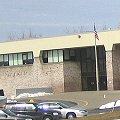- By Dan Veaner
- News
 Print
Print  When the municipal sewer project was killed last August it presented a special challenge for the Lansing Central School District. The campus is serviced by three large septic systems. Two are failing and the third is at the end of its official 'useful life.' What officials hoped would turn out to cost just over $2 million turned into $4.5 million, which District Business Administrator Mary June King said was what she hoped was a conservative estimate. Monday engineering and construction management firm Tetra Tech representatives told King and the Board Of Education the project could cost as much as $5 million.
When the municipal sewer project was killed last August it presented a special challenge for the Lansing Central School District. The campus is serviced by three large septic systems. Two are failing and the third is at the end of its official 'useful life.' What officials hoped would turn out to cost just over $2 million turned into $4.5 million, which District Business Administrator Mary June King said was what she hoped was a conservative estimate. Monday engineering and construction management firm Tetra Tech representatives told King and the Board Of Education the project could cost as much as $5 million."It's significantly more than we had been projecting based on the building condition survey," King said. "I was comfortable saying $4.5 is the most conservative estimate I can give this a couple of days ago. $5 million is an even more conservative estimate."
The schools had been put on notice by the county health department that they would have to replace the failing septics, but everybody was waiting to see if municipal sewer would become a reality. School officials had to decide whether septic replacement would cost more or less than sewer in the long run. They came up with a ball park figure of $4.5 million, but as King noted Monday, it was based on 2010 pricing. The new estimate reflects an actual project at 2014 pricing. Both she and Tetra Tech engineers say the estimate is conservative.
"I would imagine we're going to come in a little below that," King said.
"We're in a difficult position, but we don't really have a choice," said School Board President Glenn Swanson. "With the sewer project going down and our septic system replacements way overdue -- you can't have a school without a septic system. There's not a whole lot of choice."
Four options were considered: municipal sewer, sub-surface disposal, point discharge with sand filtration beds, and a package plant (a mini-sewage treatment plant) on school property. With municipal sewer off the table, a sub-surface system was deemed impractical for the soil on the school property and a package plant too expensive. That leaves the more typical septic system as the only viable choice.
"In general the systems will be similar to what you have now, but they'll be brought up to today's standards," said Tetra Tech Civil Engineering Group Manager Tom Farlow. "These systems were built to the design standards of the '60s and '70s. Based on their age it's a miracle they have lasted as long as they have."
The project will include three separate septic systems, each with its own septic tank and sand filtration with a service discharge to an ultra-violet disinfection system. From there the water will discharge to a storm sewer, swale, or ditch.
"You're looking at 18,000 tons of earth that needs to be moved," said Tetra Tech Project Manager Pam Hamel. "That equals 500 ten-wheelers. Most of what is moved around here stays here, but a lot of stuff is coming in because of the sand bed filters."
Board Of Education members expressed concern that one or more of the existing systems might fail before new ones can be constructed. There are still unknowns that will impact the final locations of the new septics and the final scope -- and cost -- of the project.
The Board Of Education is expected to take action in March to get it on the ballot for a May vote. If passed the final design is subject to state approval including a Department of Environmental Conservation (DEC) review that Hamel said typically takes 18 to 20 weeks, and bid solicitation before construction could begin in Spring 2015.
Farlow credited the district's maintenance staff and water usage policies for prolonging the existing systems' lives. But officials worry that one or more of the existing systems will fail before a new project is completed.
"What happens if the septics go?" King said. "The reality is it's still going to take time to get a project through. We're going to have a period of time where we just wouldn't have a functioning septic. Literally we would be using outhouses. We'd be renting and bringing in outhouses for our staff and our students to use."
Hamel said Tetra tech will come back to the school board at the end of February with final details. King says she and Athletic Director Adam Heck have begun meetings about the impact the project and the construction period will have on ball fields. She said she will be meeting with coaches in late February or early March.
v10i4



